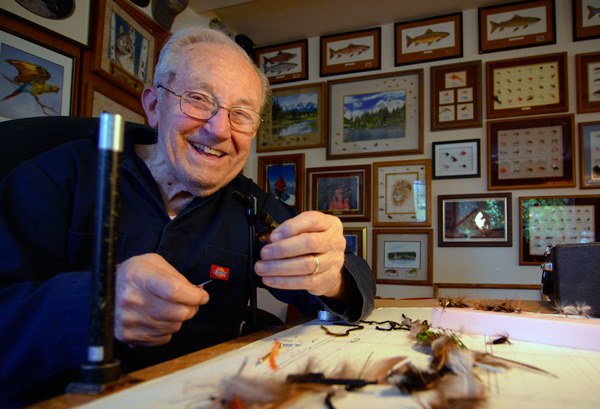A lot of words can accurately describe Gil Nyerges: teacher, artist, craftsman. To some Whidbey Island anglers, he’s a legend.
But the 93-year-old Langley resident waves off such compliments. He maintains he’s just a guy who fell in love with fishing, a long time ago, on the shores of Lake Erie in Ohio. Armed with a 20-foot bamboo pole and a bit of line on the end — it had no reel — he learned from his father the basics of a past time he would later characterize as a “science,” an “art form.”
Well, when it comes to fly fishing that is.
“It’s the only way to fish,” said Nyerges, with a knowing smile and a twinkle in his eye.
Spin casters would have something to say about such a claim, he admits, but Nyerges maintains it’s the far superior form of angling. And he would know, for the veteran fisherman has come a long way from those days with his father.
Nyerges would later develop a passion and great skill for tying flies, so much so that a few of his most successful designs can be found in tackle boxes across the country. Indeed, “Gil’s Monster” — modeled after a dragon fly on a Canadian lake — and the “Nyerges Nymph” — inspired from tiny shrimp crawling on a raised anchor — have been slaying fish for more than 50 years.
“He’s the guru of fly fishing, that’s for sure,” laughed Scott Waltenbaugh, a member of The Fishin’ Club’s board of directors. “He knows just about everything there is to know about fly fishing and tying flies.”
Nyerges, a retired Boeing engineer, is generous with his gifts. The past few years he’s made “plates,” framed cases of flies he’s personally tied, to be raffled off at the club’s annual December dinner. Waltenbaugh said the proceeds are put toward the club’s scholarship program for South Whidbey seniors who are pursuing careers in a related marine industry.
“Mathematicians are out of luck,” he said.
Nyerges has been a member of the Washington Fly Fishing Club for more than half a century, and has had an impact on a generation of fishermen, said Jeff Dodd, president of the Whidbey Island Fishing Club.
“He’s one of the guys who developed the patterns [of flies] and techniques we’re using today. … He’s a pretty special guy,” Dodd said.
Nyerges helped found the Whidbey club, which meets at 7 p.m. the second Wednesday of every month at the Race Road fire station on Central Whidbey. For nearly 30 years, he taught fly fishing classes in the spring and fall to students both young and old. He doesn’t teach any more, except for special requests, but he’s kept his registration book of all his former students. It contains hundreds of names.
 Nyerges does still tie flies, but only for fun and for friends. He insists that anyone can learn, and that there are “no secrets” to tying a successful fly — just steady hands and patience. In fact, crafting something that fish will hit is far simpler than most think.
Nyerges does still tie flies, but only for fun and for friends. He insists that anyone can learn, and that there are “no secrets” to tying a successful fly — just steady hands and patience. In fact, crafting something that fish will hit is far simpler than most think.
“It seems paradoxical, but it’s a fact,” Nyerges said.
He recalled one frustrating day on a mountain lake where the fish just weren’t biting. But instead of making a long march back to his cabin for something else to put on the end of his line, he found a twig, secured it to a bare hook and spent the rest of the day hauling in fish.
“Just about everything you put out there when the fish are hungry, they’ll hit it,” he said.
But while Nyerges doesn’t sell his flies for money, his designs aren’t lost; they can still be found in tackle shops across Western Washington, and in an impressive collection on his wall at home.
It will be on special display at the South Whidbey Bayview Senior Center for 30 days, beginning July 1.
When asked about the honor, he shrugged and smiled.
“That’s fine with me, I’ll just have bare walls for a month,” he said.


